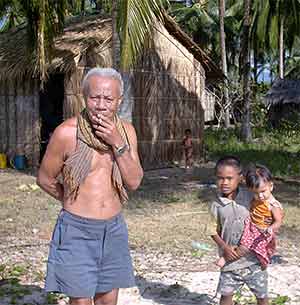The language of Cambodia.
What you name?
and where is the bathroom?

It all started in India
thousands of years ago. And came to Cambodia at least 1,300 years ago. We know this from examining the writings on the temples of the Angkor Wat complex. Also, the sounds of the current Khmer alphabet are very similar to the modern day Hindi alphabet and several words sound similar.
Since those times, the writing has been made much more complex (and difficult to read) by adding letters and extra swirls and lines to the the letters.
This original Hindi language is one of the root languages, not only of Khmer (Cambodian Language), but also of Thai, Laos, and Burma. While the written system of the language has many similarities throughout all these countries, the numbers are all written the same or very similar.
Khmer is written from left to right, top to bottom, withnospacesbetweenthewords and with very little punctuation There are 3 styles of writing: the standard textbook style which is used in handwriting, a block form based on the standard style used in magazines and newspapers, and a rounded style used on signs, titles of books and magazines, and in places on official documents and formal invitations.
The Khmer alphabet is considered to have 33 consonants and 23 vowels. There are many more consonants and vowels not included in the standard alphabet. Vowels can be in front of a letter, in back, above, below, or on both sides.
The spoken language has no particular tone, as the Thai and Vietnamese languages do. There are no regional dialects, but people from the countryside do speak a little differently from the people in the cities.
And now….. on to some Khmer words and phrases.
What is your name?
Nayaak chmooa away?
Where are you from?
Nayaak chun cheeit away?
How old are you?
Nayaak ayoo poonmaan hi?
Where are you coming from?
Mao pee na?
Where are you going?
Dto na?
(“dt” is a cross between a “d” and a “t”)
How much does it cost?
Tlai poonmaan?
I
Kinyum
you
Nayak
He or She
Go aht
Us
Yoong
They
Poouk Gay
Please
Som
Thank You
Aakoon
One more please
Som mooey teeut
I don’t want it
Awt yaw (or) Awt chung baan
Yes (for a man)
Baat
Yes (for a woman)
Chaa
No
Awt tay
O.K.
O.K .
Stop
Choop sun
Go
Dto
Wait a minute
Cham mooey plet
I don’t understand what you say
kinyum sadaap aut baan
I understand what you say
kinyum sadaap ban
I don’t understand
Kinyum aut jool
I understand
Kinyum jool hi
how much for one beer
Be yair mooey tlai poonmaan
Check please
Ketloy
One
Mooey
Two
Pee
Three
Bay
Four
Booun
Five
Bram
Six
Bram Mooey (same as five one)
Seven
Bram Pee
Eight
Bram Bay
Nine
Bram Booun
Ten
Dawp
Eleven
Dawp Mooey
(numbers from 11 to 19 are pronounced as the word ten, followed by the second number. 16 would be Dawp (10) Bram Mooey (6).
20
Maapay
21
Maapay Mooey (20 and 1)
30
Saamsup
40
Sie Sup
50
Haasup
60
Hoke sup
70
Jetsup
80
Bairtsup
90
Gaowsup
100
Mooey Roy
1000
Mooey Pawn
10,000
Mooey Mun
The thousand are counted in 10,000 increments.
So 30,000 would be Bey Mun (3 ten thousands)
13,492
Mooey Mun, Bey Paw, Booun Roy, Gaowsup, Pee
There is a fly in my soup
Meeun roy kanung soop kinyum
Where is the bathroom?
Bantoop duk no I na?
No problem
Aut bine yaha
How are you?
Saak sabai tay?
I’m fine
Sok sabai
Goodbye
Som leea hi
See you tomorrow
Sa aik chooup kaneea
I want to go to Kep
Kinyum chung dto groong gipe
Finished
Aw hi